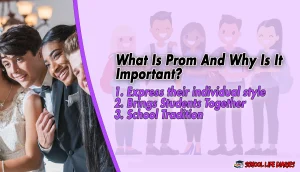Prom is a highly anticipated event for high school students, and it’s often seen as the ultimate right of passage to signal the end of their educational journey. But what some people don’t know is that prom isn’t just reserved exclusively for seniors.
There are many different factors that can determine whether or not someone may be eligible to attend. In this blog post, we will explore the various criteria and exceptions that define who can go to prom, giving teachers and students alike an inside look at this special occasion.
What Is Prom And Why Is It Important?
Prom night is one of the most exciting nights of the high school experience. It is a special evening where teens dress up in their fanciest attire to celebrate the end of their high school year. During prom night, students usually hold a formal dance and after party, often hosted by the parents or guardians of the students.
Many teens like to get their hair and makeup done professionally, book limousines or party buses with friends, and even rent a venue for an after-prom gathering. Prom is an event that brings students together in celebration, marking the end of the school year and the beginning of a new chapter in their lives.
It is a timeless tradition that many students look forward to each year. As such, there are several important reasons why prom is so meaningful for young people. Here are a few reasons why prom is important:
1. Express their individual style:
Attending prom allows students to express their individual style and create lasting memories with their friends. Whether it’s wearing an elaborate dress or tuxedo, attending the prom is a fun way for people to show off their unique personalities.
It also provides them with an opportunity to take pictures together in order to capture those special moments that will remain cherished for years to come.
2. Brings Students Together:
Prom is a great way to celebrate the accomplishments of the year and recognize the hard work of each student. It’s a time for students to come together and take pride in their achievements, from academic success to simply having made it through another school year.
The occasion also provides an opportunity for teachers and mentors to acknowledge the efforts of their students and wish them luck as they move on to the next stage in their lives.
3. School Tradition:
Prom is a special opportunity for people to bond with one another. It serves as a platform where young people can create lasting relationships, build new friendships, and form memories that will stay with them long after they have graduated.
What Year Is Prom Held?
Prom is typically held towards the end of the school year, usually in the springtime. Depending on the school district, prom may take place in late May or early June. It is usually scheduled for a Friday or Saturday night, and many schools choose to hold their proms at a local banquet hall or hotel.
Schools often book these venues well in advance, so it’s important for students to plan ahead if they want to attend. In order to attend a prom, students typically need to purchase tickets from their school or from another student selling a ticket.
Prices can vary widely depending on the venue and any extras like food, drinks, or entertainment. Proms are usually semi-formal affairs, so students will typically wear a formal dress or suit. Some schools may have a specific theme that dictates the type of clothing or decorations used.
What Grade Level Is Prom?
Prom is typically associated with high school students and is often celebrated in their junior or senior year. It is a special occasion where they can dress up and celebrate the end of another academic year with friends. Most schools organize different proms for different age categories such as junior, senior, freshmen, and sophomores who are considered underclassmen.
Proms are not just fun and games, they also signify a rite of passage into adulthood. They provide an opportunity for students to take part in an important social event that marks their transition from high school life to adult life.
From prom dresses to the DJ playlist, all the details need to be planned with precision to ensure everyone has a great time. It is important to make sure that the event is inclusive and that everyone has a chance to enjoy themselves, regardless of age or social standing.
Can A Freshman Go To Prom?
No, a freshman cannot go to prom typically. Prom is usually reserved for upperclassmen such as juniors and seniors in high school. This is because prom is typically seen as a milestone in the high school experience that should be shared with classmates who have gone through the same experiences leading up to this special event.
It is important to remember that a prom is an event that should be enjoyed by those who are of legal age, and since freshmen are typically the youngest in high school, they would not meet this requirement. Some schools may make exceptions for younger students if there are special circumstances.
What Age Group Goes To Prom?
Prom is typically attended by high school juniors and seniors who are between the ages of 16 and 18. Some younger students may still be in attendance as dates of juniors and seniors.
Freshmen are usually 14 to 15 years old, while sophomores usually range from 15 to 16 years old. These younger students may attend if they are invited by a junior or senior and have the approval of their parents.
Is Prom Only For Seniors?
No, prom is not only for seniors. While the traditional view of prom is that it is a senior-only event, many schools now open up the opportunity to attend to any student who wishes to participate. For example, some high schools will allow junior class members to attend if they have a special invitation or if they meet certain criteria.
No matter what grade level you are, it is important to remember that everyone should be able to enjoy the experience of prom and feel included. Many schools offer events for younger students on a similar theme as prom, such as ‘Winterformal’ or ‘Frolic’.
These offer an opportunity for younger students to participate in a special event that is age appropriate and geared toward their interests.
Can A Senior Go To Prom With A Freshman?
No. Generally speaking, high school seniors are typically old enough to drive and they may have already graduated. Freshmen are just beginning their high school journey and are likely still too young to drive or participate in traditional senior activities.
It is not appropriate for a senior to attend prom with a freshman. This could be interpreted as predatory behavior which is highly frowned upon.
Can Seniors Go To Prom With A Sophomore?
Yes, seniors can go to prom with a sophomore in some cases. Generally, age restrictions are not imposed on who may attend the prom as long as they fit within the school’s guidelines and regulations. Depending on the school, there may be age limits or certain restrictions like senior-only events.
If those criteria are not in place, then seniors can go to prom with a sophomore. It is important for schools to be aware of any potential issues that may arise when someone outside the traditional age range attends a school event like the prom. For example, if alcohol is served or other adult activities are taking place at the event.
Can You Drink At Prom?
It is important to note that whether you can drink at prom depends on the laws of your state, as well as the policies of your school. Generally speaking, students under the age of 21 are not legally allowed to consume alcohol, and even if they are allowed to do so in their home state, many schools have strict policies prohibiting it.
At What Age Is Prom In America?
In America, the age at which people typically go to prom is around 17 or 18 years old. Prom is a milestone event for high schoolers and marks the end of their secondary education.
Prom typically takes place in the springtime, usually during the month of May. It’s a time for teens to show off their fashion sense, dance the night away, and take pictures with their friends. The evening usually features a formal dinner followed by a lively party where teens can dance to their favorite tunes and socialize.
In many schools, there is an opportunity for couples to be crowned “Prom King” and “Prom Queen” at the end of the evening. This honor is usually based on a vote taken by the attendees and can be a memorable event for the recipients.
Is Prom After GCSE?
No, prom is not after GCSE. Prom typically occurs at the end of high school or secondary school in the UK, which is usually at the age of 16-18. GCSEs are taken by students aged 14-16, so prom happens after students have completed their GCSEs and are about to move on to further education or the world of work.
Short History Of Prom
Prom has been a part of high school culture in the United States since the early 1800s. Originally, promenades were thrown by universities as a way for wealthy families to show off their privilege and social standing. In the late 1890s, prom moved to high schools, but only for graduating seniors and their families.
It was more of an afternoon tea than a dance party; boys wore their “Sunday best” while women wore dresses they inherited from their mothers. Over time, prom has evolved into what we know today extravagant evening event with elaborate decorations, expensive gowns and tuxedos, and popular music that allows students to celebrate their achievements before heading off into adulthood.
In the 1930s, prom became more of a social gathering and eventually morphed into the all-night affair it is today. It’s no wonder why prom remains one of the most cherished memories for high schoolers.
Pros And Cons Of Allowing Students Of All Grades To Attend Prom
10 Pros Of Allowing Students Of All Grades To Attend Prom:
1. Prom can be a time for students of all ages to come together and celebrate the end of the school year, creating a sense of camaraderie among different grade levels.
2. Allowing students of all grades to attend prom provides an opportunity for younger students to gain insight into older peers’ experiences with academic and social life.
3. By opening prom to different grade levels, the festivities can be made more exciting; younger students can bring newer energy to the event and experienced upperclassmen can share their ideas with the rest of the school community.
4. A multi-grade prom also allows for greater involvement from parents and other members of the school’s community.
5. Parents and other members of the school can provide guidance and advice to students, as well as contribute ideas for decorations, food, music, and other aspects that are necessary to make a successful prom night.
6. Allowing multiple grade levels to attend prom also strengthens relationships within schools and creates lasting memories that bridge different age groups together.
7. This is especially important as it helps promote socialization and understanding between the students and their peers, both within and outside of their own grade levels.
8. Multi-grade proms can be an enjoyable event that all generations of a school’s community can partake in and benefit from.
9. With the right planning and approach, a multi-grade prom can be an unforgettable experience that will bring people together for years to come.
Related Article: Can Students Go On Strike? Is It Legal And What Are Their Rights?
10 Cons Of Allowing Students Of All Grades To Attend Prom:
1. Younger students may become influenced by older peers in a negative way, such as by drinking alcohol or engaging in other inappropriate behavior.
2. Parents of younger students might feel uncomfortable with their children attending a large event with much older students.
3. Students of different ages may have different interests and find it difficult to interact with each other.
4. Teachers may find it difficult to maintain discipline in an intergenerational classroom, as older students often act out or challenge authority figures more than younger students do.
5. Older students might become bored or frustrated with the slower pace of learning or lack of challenging material in an intergenerational classroom setting.
6. Younger students might not have the maturity or emotional stability to handle the challenges of being in a classroom with older students.
7. There may be issues around different levels of technological proficiency and understanding, as younger and older generations tend to have different levels of experience with digital tools and platforms.
8. It can be difficult to keep all students engaged in an intergenerational classroom, as older students can become easily bored and younger students may not have the same level of knowledge or experience.
9. The different levels of maturity among students can lead to issues such as bullying, teasing, or cliques forming amongst certain age groups.








